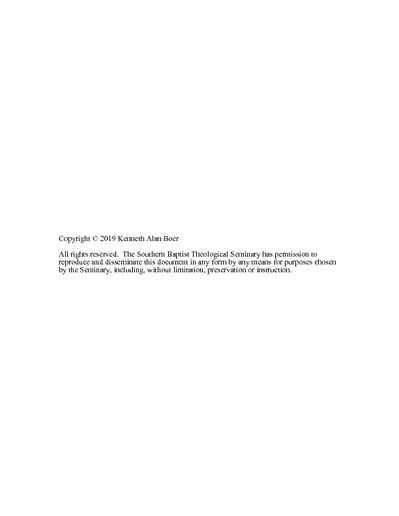| dc.description.abstract | The purpose of this research was to determine the characteristics described in worship leader job descriptions in the Southern Baptist Convention (SBC) and examine the correspondence of these characteristics with worship leadership degree programs at Southern Baptist-affiliated colleges and universities. The researcher collected worship leader job descriptions from the website of the Southern Baptist Convention and conducted software-based content analysis to identify the knowledge, skills, abilities, and other characteristics (KSAOs) found within. Forty-four KSAOs were identified on variety of musical, spiritual, leadership, and interpersonal topics. The researcher then collected the course descriptions from undergraduate worship studies and sacred music programs accredited by the National Association of Schools of Music (NASM) at twenty-two SBC colleges and universities and analyzed them for the presence of the KSAOs identified in the first phase of the study.
The primary KSAOs identified in the job descriptions in the study were "lead corporate worship publicly," "people skills and teamwork with staff," "leadership skills," "management and administrative skills," "plan worship services," "lead or oversee choir," "lead vocalists," "lead worship band," "oversee worship technology," and "conducting skill." The primary KSAOs identified in course descriptions were "formal musicianship (music theory, aural skills, arranging)," "play an instrument (keyboard or guitar)," "general biblical and theological knowledge," "knowledge of philosophy and history of church music," "personal vocal skill," "conducting skill," "oversee worship technology," "lead or oversee choir," "theology of worship," and "plan worship services." Two statistical tests were employed to compare the ranking of KSAOs in job descriptions and course descriptions. While a Spearman rank correlation test indicated a statistically significant correlation between the ranking of KSAOs in job descriptions and course descriptions, these findings could not be replicated with a Kendall correlation.
The study provides a summary of worship leader training in the SBC since the denomination's 1845 founding, the development of contemporary worship from the Jesus movement to the present, biblical requirements for the leadership of public worship, and an overview of contemporary evangelical definitions of the worship leader’s role. The research concludes with suggested improvements for worship leader and worship pastor training and development, especially in the SBC. | en_US |

